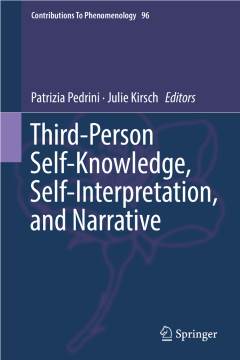Repository | Book | Chapter

(2018) Third-person self-knowledge, self-interpretation, and narrative, Dordrecht, Springer.
The paper illustrates and clarifies the distinction between first-personal and third-personal self-knowledge. It is argued that the characteristic traits of first-personal self-knowledge are groundlessness, transparency and authority. It is maintained that each of these characteristics is a necessary and a priori aspect of first-personal self-knowledge.The thesis that there is first-personal self-knowledge is then defended from challenges coming from cognitive science, which are taken to show that we may fail to know dispositional (sometimes causal) elements of our mental states. Yet, this does not impugn the fact that, regarding the non-dispositional aspects of our mental life, we can and do have first-personal knowledge of them.It is then argued that third-personal self-knowledge is achieved through a plurality of methods, which vary from inference to the best explanation, to induction, simulation, testimony and inferential conceptual deployment. The ensuing self-ascriptions are therefore neither groundless, nor transparent or authoritative and are the result of substantive cognitive achievements.
Publication details
DOI: 10.1007/978-3-319-98646-3_2
Full citation:
Coliva, A. (2018)., Self-knowing interpreters, in P. Pedrini & J. Kirsch (eds.), Third-person self-knowledge, self-interpretation, and narrative, Dordrecht, Springer, pp. 13-29.
This document is unfortunately not available for download at the moment.


